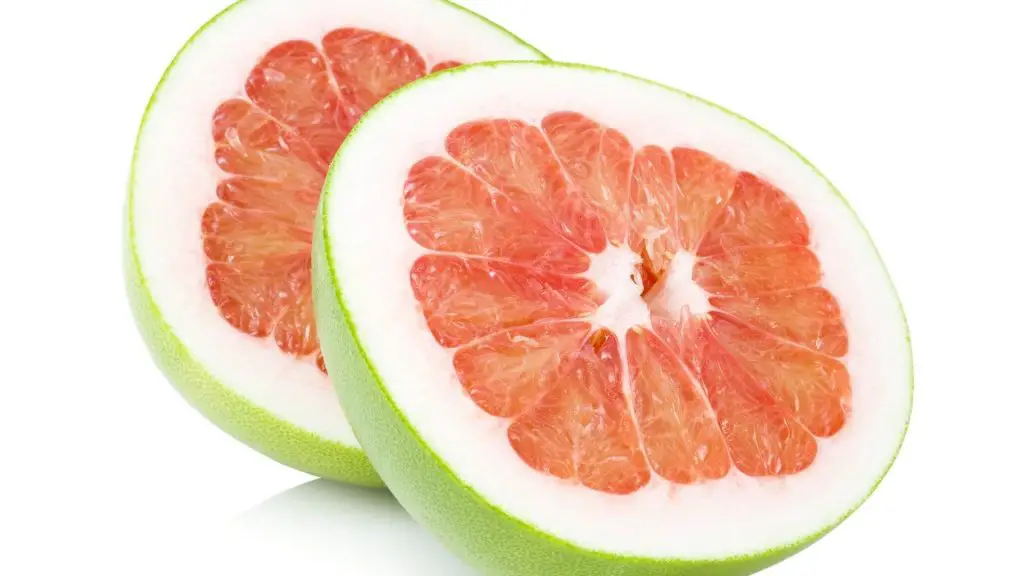Pawscessories is reader-supported. When you buy via links on our site, we may earn an affiliate commission at no cost to you.
Learn more.
Can dogs eat Pomelo? This is a question that we often get asked. Unfortunately, the answer, like most things when it comes to dogs and human food, is not straightforward.
In short, dogs can have Pomelo, but only in moderation. While Pomelo is considered safe, it’s high in sugar. Too much sugar can cause various health issues in dogs. However, in small doses, Pomelo is healthy for dogs as it contains fiber, vitamin C, protein, riboflavin, copper, potassium, and thiamine.
In this article, we will explore the pros and cons of letting your dog snack on some pomelo. We’ll also answer some of pet owners’ most common questions about dogs eating this fruit.
So, whether you’re wondering if Pomelo is good for your pooch or trying to figure out what to do if he accidentally eats too much, keep reading!
Table of Contents

What is Pomelo?
To better understand if dogs can eat Pomelo, we need to look at the nutrition of the fruit.
Pomelo is a citrus fruit that is native to Southeast Asia. It is the largest member of the citrus family and can weigh up to five pounds! Pomelo looks like a grapefruit but has a sweeter taste and softer flesh. The fruit’s skin is thick and can be either green, yellow, or pink.
Pomelo is a good source of vitamins C and K and fiber. It also contains antioxidants, which can help to boost the immune system.
Nutrition Information
One peeled Pomelo (610 grams) contains:
- Calories: 231
- Protein: 5 grams
- Fat: 0 grams
- Carbohydrates: 59 grams
- Fiber: 6 grams
- Riboflavin: 12.6% of the Daily Value (DV)
- Thiamine: 17.3% of the DV
- Vitamin C: 412% of the DV
- Copper: 32% of the DV
- Potassium: 28% of the DV
As you can see, Pomelo is a nutrient-dense fruit that is high in vitamins and minerals. However, the 59 grams of carbohydrates are made up mostly of sugar. So, while Pomelo does have some health benefits, it’s a very high-sugar fruit.

Can Dogs Eat Pomelo?
Now that we know what’s in Pomelo, let’s answer the question: can dogs eat it? The short answer is yes, but only in small amounts.
Pomelo is not poisonous to dogs and won’t cause any immediate health problems if they eat a small amount. However, because of its high sugar content, Pomelo should be considered a treat rather than a regular part of your dog’s diet.
Eating too much sugar can lead to weight gain and other health issues in dogs, such as diabetes. So, while a little pomelo here and there probably won’t hurt your pup, it’s best to limit their intake.
If you decide to give your dog pomelo, remove the skin, leaves, and seeds first. The fruit’s skin is very tough and hard for dogs to digest. The seeds also contain a small amount of cyanide, which is poisonous to dogs (and humans).
It’s also important to note that Pomelo can interact with certain medications, such as insulin. So, if your dog is on any medication, check with your vet before giving them Pomelo (or any other human food).
Pomelo has many health benefits for dogs but only when given in moderation.
Is Pomelo Safe For Dogs To Eat?

Yes, Pomelo is safe for dogs to eat in small quantities. However, the fruit is high in sugar and can cause weight gain and other health problems if your dog eats too much of it.
Some other potential issues are the skin, seeds, and leaves. The skin of the Pomelo is very tough and can be hard for dogs to digest. In addition, the seeds and leaves contain a small amount of cyanide, which is poisonous to dogs.
Lastly, if your dog is taking any medication, this could pose a risk. For example, Pomelo can interact with insulin. So, if your dog is on diabetic medication, it’s important to check with your veterinarian before giving them Pomelo.
Aside from those safety concerns, Pomelo offers dogs many benefits and is safe to eat.
Health Benefits Of Pomelo For Dogs
Pomelo is jam-packed with vitamins, minerals, and antioxidants, which offer many health benefits for dogs.
Here are some benefits dogs can receive from Pomelo as an occasional treat:
Muscle Health
Protein is essential for maintaining and repairing muscle tissue. Pomelo contains roughly 5 grams of protein per Pomelo.
A diet rich in protein can help maintain muscle mass, which is important for keeping your dog active and healthy.
Improves Immunity
The fruit is an excellent source of vitamin C, which can help to boost the immune system. Vitamin C is essential for dogs (and humans) because it helps the body to fight off infection.
Aids in Digestion
Pomelo is also a good source of fiber, which can help with digestive issues. If your dog is constipated, eating Pomelo may help relieve some symptoms.
Fiber is also beneficial for overweight dogs because it helps make them feel fuller after eating.
Reduces Inflammation & Helps Joint Health
Pomelo also contains a flavonoid called naringenin, which has anti-inflammatory properties. This means that it can help reduce swelling and joint pain. In addition, it is a good source of copper, which is important for joint health.
Prevents Cancer
Pomelo contains naringenin, which has been shown to have anti-cancer properties.
Studies have shown that naringenin can help to prevent the growth of cancer cells, and it may also help to kill existing cancer cells.
Pomelo also contains other antioxidants, such as vitamin C and Limonene, which can also help to protect cells from damage and prevent cancer development.
Full Of Beneficial Vitamins & Minerals
Pomelo is an excellent source of many vitamins and minerals, such as vitamin C, copper, fiber, and protein.
These nutrients are essential for dogs (and humans) and can help to improve overall health. In addition, they contain three antioxidants, lycopene, naringin, and naringenin.
Antioxidants can help protect cells from damage and reduce inflammation.
Dangers Of Pomelo For Dogs

While there are many benefits of Pomelo for dogs, there are also some dangers that you should be aware of.
The most significant danger is the fruit’s skin, seeds, and leaves. The skin is very tough and can be hard for dogs to digest. In addition, the seeds and leaves contain a small amount of cyanide, which is poisonous to dogs (and humans).
Suppose your dog eats the skin, seeds, or leaves of a pomelo. In that case, it could lead to vomiting, diarrhea, difficulty breathing, weakness, and collapse. Another potential danger is the sugar content of the fruit. Pomelo is high in sugar and can cause weight gain and other health problems if your dog eats too much of it.
If your dog is overweight or has a pre-existing health condition, eating Pomelo can exacerbate the problem. So avoid giving an overweight or medicated dog these fruits.
Lastly, Pomelo contains Limonene. While Limonene is safe for dogs in small amounts, it can be toxic if consumed in large quantities.
Limonene can cause vomiting, diarrhea, lethargy, and depression in dogs. It can also cause liver damage.
How Much Pomelo Can A Dog Eat?
As with most fruits, it’s important to feed your dog Pomelo in moderation.
How big your dog is will affect how much it can eat. For example, a small dog may only be able to have a small piece, while a large dog may be able to eat a larger slice of Pomelo.
It’s always best to start with a small amount and see how your dog reacts. Then, if they seem to enjoy it and don’t have any adverse reactions, you can slowly increase the amount you give them.
As a general rule of thumb, treats should never account for more than 10% of your dog’s daily calorie intake. Pomelo is high in sugar and calories, so ensure they have no more than 10% of their daily calories from this fruit.
A few small bites are all they need.
What To Do If Your Dog Eats A Pomelo?

Suppose your dog pulls a Pomelo off the table and starts chowing down. In that case, you’re probably concerned, especially with all the conflicting information about these fruits.
As a rule of thumb, contact your vet immediately if you notice anything “off” about your dog after eating a Pomelo.
To better answer this, I got advice from Dr. Littlejohn to find out what he’d recommend.
Here are a few big questions vets will usually ask in these situations.
- How much was consumed?
- How big is your dog?
- How long ago did they consume it?
- Any changes to your dog’s behaviors?
- How’s your dog’s energy level?
- Any signs of physical pain or discomfort?
- If your dog’s drinking or eating
- If they vomited or pooped since eating it (and what it looked like)
Every situation differs depending on how much they ate and how big your dog is. Still, these are some important things vets will ask. Knowing these common questions can help determine what you should pay attention to.
Of course, you know your dog best, so if you think something is off, you’re likely right. However, since Pomelo is considered non-toxic, 99 out of 100 times a dog will be completely fine.
However, Dr. Littlejohn mentioned that since Pomelo is high in sugar, small dogs are at risk of pancreatitis and large dogs are at risk of bloat from overeating. In addition, Pomelo skin contains Limonene, which can be toxic if consumed in large quantities.
So be on the lookout for symptoms such as:
- Vomiting
- Diarrhea
- Lethargy or weakness
- Abdominal pain or bloating
- Loss of appetite
- Drooling
- Difficulty in walking
Any signs indicating something is wrong with your dog is a red flag. So if you notice anything, contact a veterinarian to help you immediately.
Other Frequently Asked Questions
Are Pomelo and grapefruit the same?

No, Pomelo and Grapefruit are not the same. Pomelo is the largest citrus fruit and is more like a cross between an orange and a grapefruit. Grapefruit is smaller and has a sweeter taste than Pomelo. They are also more acidic than Pomelos.
Can A Dog Be Allergic To Pomelo?
Yes, like with any fruit, some dogs can be allergic to Pomelo. The most common symptom of an allergy is itchy skin. Notice your dog scratching more than usual after eating Pomelo. They may be allergic, and you should stop feeding it to them.
Other symptoms include:
- Swelling of the face, ears, or lips
- Hives
- Vomiting
- Diarrhea
- Trouble breathing
Is Pomelo Toxic To Dogs?
No, Pomelo is not toxic to dogs. However, it is high in sugar and calories. So it’s important to feed this fruit to your dog in moderation. Pomelo also contains a compound called Limonene, which can be toxic to dogs if consumed in large quantities.
Can Dogs Eat Pomelo Skin?
No, dogs should avoid eating Pomelo skin. The skin is high in phototoxic compounds, oils, and citric acid. In addition, it contains a compound called Limonene which can be toxic to dogs if consumed in large quantities.
Other posts you may find interesting:
Can Dogs Eat Acai Berries? Risk & Tips If They Do (Vet Answers)
Can Dogs Eat Bitter Melon? Benefits + Risks (Vet Answers)
Can Dogs Eat Prickly Pears? We Consulted Vets To Find Out
Can Dogs Eat Fruit Snacks? (Incl. Motts & Welch’s Fruit Snacks)
